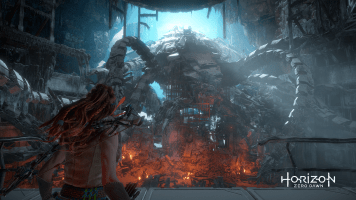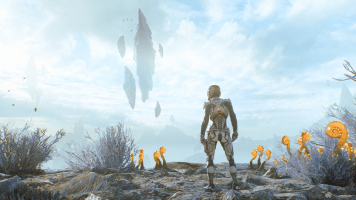With the release of Horizon Zero Dawn and Mass Effect Andromeda (ME: A), March was a busy month for gaming. I’ve been playing ME:A since it released and have been enjoying the game overall (despite a few frustrations, gripes, and not feeling invested until more than a few hours in). Since Horizon was the last game I played before ME:A, I couldn’t help but make a few comparisons between the games even though they are different in many ways, which led me to think about the narrative hook or pull of each game. Warning: minor spoilers ahead.
Arguably, Horizon has the stronger opening. The story, as a whole, has its flaws, but I felt drawn to Aloy and her journey of self-discovery from the beginning. Plus she’s snarky, inquisitive, and a certified badass. ME:A‘s Sara Ryder or Scott, depending on which twin you choose, isn’t quite as compelling, which is a shame because colonizing a new galaxy among various threats should be exciting.
In Horizon players are introduced to a young Aloy who is outcast and teased. She’s rather adorable-looking in her obstinate way, and I found myself smiling at the little pip from the start. So Horizon gets +1 for introducing Aloy as a baby first and then showing her as a child to adulthood. Having an orphaned protagonist develops pathos early on, and that sympathy is only strengthened as Aloy pushes to discover her mother’s identity and her own true origins.
Sara Ryder is an educated woman with experience working with both the Alliance military and with scientists. She’s inquisitive and is driven to ensure success in the Andromeda galaxy. Beyond that, ME: A doesn’t give players much incentive to feel attached to Sara from the beginning. Sure, I know that Sara has a brother and a father, but much of who Sara is, and who she will be, is dependent on the player’s choices and what is revealed as the game progresses. This isn’t a bad thing; I’m used to games granting players the ability to step into the game and become the protagonist, but because of this, Sara feels like more of a shell than Aloy.
Which brings me to father figures. Both games feature “dads” from the start: Horizon has Rost and ME: A has Alec. While Alec is the biological father of the twins, Rost is an adoptive parent given the task of raising Aloy by the matriarchs.
One of the reasons I found myself liking Rost was because he too is an outcast living at the fringe. He’s not allowed to socialize or talk to anyone and then suddenly his life changes when he is given this little baby to care for. It’s heartwarming. +998999 to Horizon. 😉
Ahem. On the other hand, Sara’s dad is down to business. He’s serious and perhaps a little cold even to his children. He’s not the dad who is going to encourage you with loving words. Instead, he’ll take the training wheels off before giving you a shove down the driveway. If you fall down, he’ll prop you back up and tell you to try again. I might be exaggerating slightly, but the “softest” we see Alec is still twice as hard as Rost’s most frustrating moment dealing with an obstinate Aloy.
Maybe that’s part of it. Rost is more endearing than Alec, but that still plays a part in how engaged I was with each game. Combine that with each fathers’ relationship with their children and the picture starts to clear. Aloy is full of character, and Rost is likeable. Sara is a bit flat, and her father is distant. When compared, the first duo comes across as being more genuine.
Beyond the initial relationships of each game, the voice acting also plays a part in likeability and engagement. I’m more than a few hours into ME: A, and it has occurred to me that the quality of the voice acting is a bit off. However, I think that has more to do with the game’s writing than the talent of the actors. Which makes me wonder, does it all come down to the writing?
After all, it’s difficult to care for Sara being thrust into the position of Pathfinder (daddy’s shoes) after her father’s death when those events happen so quickly. Players barely have time to figure out what buttons do what when what should be an incredibly emotional and defining moment happens to a protagonist they know next to nothing about. The emotional draw isn’t there yet; it hasn’t had time to develop. And while Rost’s death occurs early on in Horizon, players get to see his interaction with Aloy—his love and frustration—which adds dynamic to the game’s early hours. I cared about Rost because he seemed real and because of Aloy’s relationship with him.
Games don’t need to spend hours developing relationships between characters. In fact, Horizon is a wonderful example of how to establish an important relationship in a matter of minutes. What seems to set these two games apart has to do with the nature of each protagonist (Aloy is a fleshed out character that the player experiences while players have more agency in defining who ME:A‘s protagonist is), the depth of each games’ writing, and the emotional layering of relationships created early on.
I would be curious to know what you think about each games’ early hours. Did you find Horizon Zero Dawn or Mass Effect: Andromeda engaging from the first few hours?



